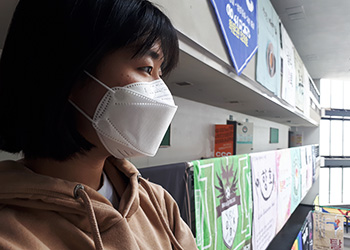
An enraged university student in Gwangju sent a fake letter to 17 Offices of Education nationwide on March 8, after his university had rejected similar proposals.
His letters impersonated President Moon Jae-in calling for universities to adopt regulations in response to fine dust such as implementing “short classes when fine dust exceeds a certain level,” according to Gwangju Seobu Police Station.
According to the Seoul Metropolitan Government’s official website, being exposed to air with high levels of fine dust can cause skin troubles and cause inflammatory symptoms in the respiratory system.
Any levels of PM(Particulate Matter) 10 above 81 micrograms per cubic meter is considered unhealthy or classified as “bad” by two South Korean authorities, Korea Environment Corporation (KECO) and Korea Meteorological Administration (KMA).
Fine dust has been at a “bad” level for seven days out of 17 from the start of the spring semester on March 4 to 20 in Seodaemun district, where Ewha is located. It is evident that fine dust issue is a serious problem that lacks a practical solution, especially for university students.
On March 6, the Ministry of Education (MOE) announced its action to respond to the fine dust issue, such as plans to install air purifiers in all schools this year. However, MOE has not announced any regulations for universities relating to fine dust.
“I feel that the university has no concrete plan to protect students’ health in the face of fine dust,” said Nam Jae-hyeon, a freshman majoring in English Education.
According to Ewha Womans University Health Service Center, approximately 60 undergraduates visit the center each day due to throat-related health issues. More than 60 percent of the patients feel that fine dust is responsible for their symptoms.
The basic guidelines provided by Ewha Womans University Health Center include staying hydrated and wearing a fine dust mask as often as possible.
University professors and students have introduced an eco-friendly and highly efficient fine dust mask invented by the Seoul National University (SNU) Department of Mechanical and Aerospace Engineering in 2017 that can filter out even ultra-fine dust with high efficiency.
Nevertheless, Ewha is hesitant to install air purifiers in the school campus due to uncertainty over their effectiveness, according to a spokesperson from the office of Facilities Management Safety Team.
“Ewha realizes that the fine dust issue requires special attention and there is an ongoing experiment on whether installing air purifiers in the school campus will actually benefit students’ health,” the spokesperson added.
However, the experiment is still at an early stage and there are currently no specific regulations to protect students’ health rights in universities.
Politicians such as Go Eun-young from Green Party Korea criticized the lack of health-related regulations in universities.
“There is a long-rooted misconception that the younger generation do not need as to take as much precautions as elderly people or children do,” Go said.
“That is why universities especially lack practical solutions related to fine dust unlike other institutions like elementary schools. Being young does not mean being healthy and university students need the same regulations applied to them. Once the students lose their health rights, they automatically lose their rights to learn as well.”
“The initiatives should come from students,” said Professor Thomas Kalinowski of the Graduate School of International Studies who built his own fine dust sensor at home as part of a citizen science project.
“Policies such as switching the shuttle buses to electronic and restricting traffic on campus may be necessary in the future.”

